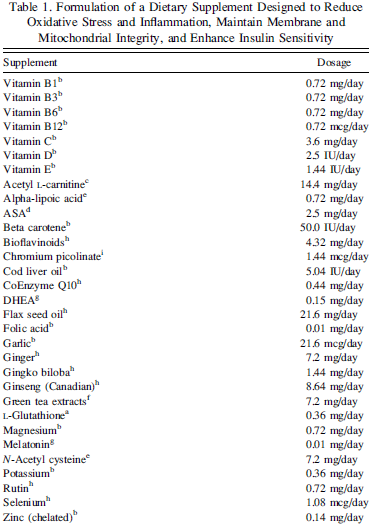Do I really want to supplement on iron oxide (rust), take an overdose of 1 toxic synthetic form of vitamin E or take folic acid instead of folate where only a part of the folic acid gets metabolised into folate and the other part remains unmetabolised (what positive purpose would that serve?) Or I could do some research, spend a few more $ and get myself a high quality supplement product which will do what I pay it to do.
Personally totally agree. Did search and do follow all these consideration. However, results like this do keep my bias in check, where one again can see that possible harm of something like Centrum due to these fallacies, seems indeed non-existent.
Centrum or other El cheapos won't kill me, but it will empty my wallet for nothing and if using that supplement and think I don't need to eat healthy foods (because I'm taking centrum which is 'complete from A to zinc' - NOT) then there is a negative impact associated with it because most of it gets pissed out anyway.
I'm not against supplements at all. I take lots. But there are some products out there I would not put in my body (even for free).
Again agreed. I wouldn't either. But can't follow the often repeated argument that most vitamins gets excreted anyway. All the food we take eventually also gets excreted after having done it's job. Which also couldn't be taken as if we could do away with food, if we want to stay healthy.
Nutrients can only supplement a diet. But if for whatever reason one is on a SAD, don't want do research papers so often conflicting - a Centrum a day is still the logical solution to avoid at least some of the widespread and completely superfluous deficiencies:
http://www.ewg.org/r...deficiencies-us
Nutrient from food alone, ranked by the occurrence of dietary inadequacy among adults | Percentage of dietary intakes below the estimated average requirement for a specific population* | Naturally occurring sources of nutrient** |
2-to-8-year-old children | 14-to-18-year-old girls | Adults 19 and older
Vitamin D | 81% | 98% | 95% | Fatty fish, mushrooms [vitamin D is naturally formed in the body when skin is exposed to sunlight; vitamin D is added to fortified milk]
Vitamin E | 65% | 99% | 94% | Nuts, seeds, vegetable oils, green leafy vegetables
Magnesium | 2% | 90% | 61% | Whole grains, wheat bran and wheat germ, green leafy vegetables, legumes, nuts, seeds
Vitamin A | 6% | 57% | 51% | Preformed vitamin A: liver, fatty fish, milk, eggs; provitamin A carotenoids: carrots, pumpkins, tomatoes, leafy green vegetables
Calcium | 23% | 81% | 49% | Milk, yogurt, cheese, kale, broccoli
Vitamin C | 2% | 45% | 43% | All fruits and vegetables, particularly citrus fruits and tomatoes
Vitamin B6 | 0.1% | 18% | 15% | Many foods; highest levels in fish, beef, poultry, potatoes and other starchy vegetables, and fruit other than citrus
Folate | 0.2% | 19% | 13% | Many foods; highest levels in spinach, liver, asparagus, Brussels sprouts [mandatory, standardized addition to enriched flour and flour products]
Zinc | 0.2% | 24% | 12% | Red meat, poultry, beans, nuts, some seafood, whole grains
Iron | 0.7% | 12% | 8% | Highest amounts in meat and seafood; lower levels in nuts and beans [mandatory, standardized addition to enriched flour and flour products]
Thiamin | 0.1% | 10% | 7% | Whole grain products [mandatory, standardized addition to enriched flour and flour products]
Copper | 0% | 16% | 5% | Shellfish, whole grains, beans, nuts, potatoes, organ meats (kidneys, liver)
Vitamin B12 | 0% | 7% | 4% | Animal products: fish, meat, poultry, eggs, milk
Riboflavin | 0% | 5% | 2% | Milk and dairy products, eggs, meat, green leafy vegetables, legumes [mandatory, standardized addition to enriched flour and flour products]
Niacin | 0.1% | 4% | 2% | Meat, fish, seeds and nuts, whole grains [mandatory, standardized addition to enriched flour and flour products]
Selenium | 0% | 2% | 1% | Found in different plant and animal foods; highest levels in seafood and organ meats (kidneys, liver)
These estimates only take the RDA (ridiculous daily allowance) in consideration. Not widespread gene deviations, which in up to half the population make it harder to metabolize for example folic acid or beta-carotene into active folate or Vitamin A. And other absorption and utilization issues (lke with widespread medications). So the real percentages of deficiencies can be assumed a lot higher.






























































